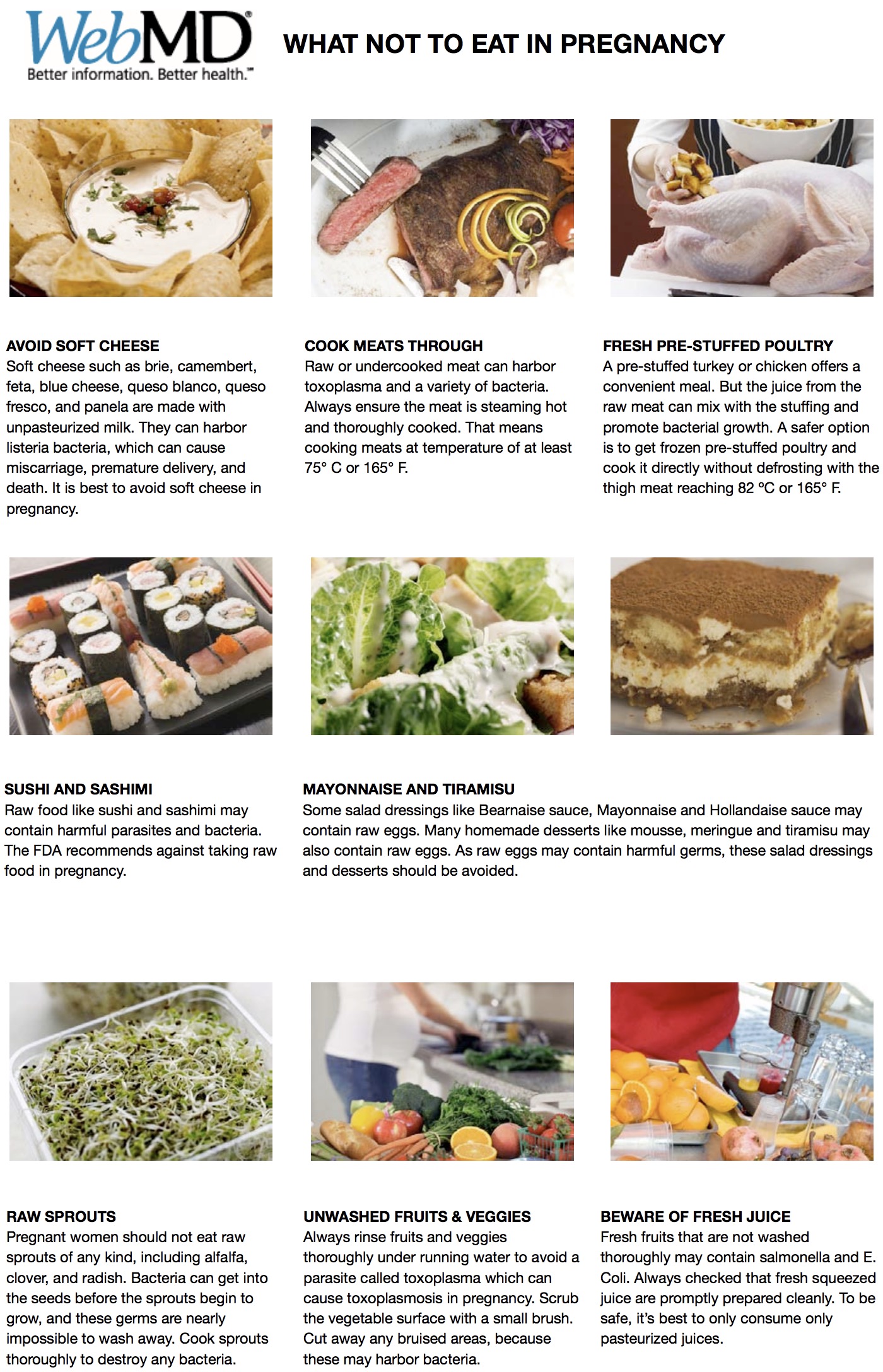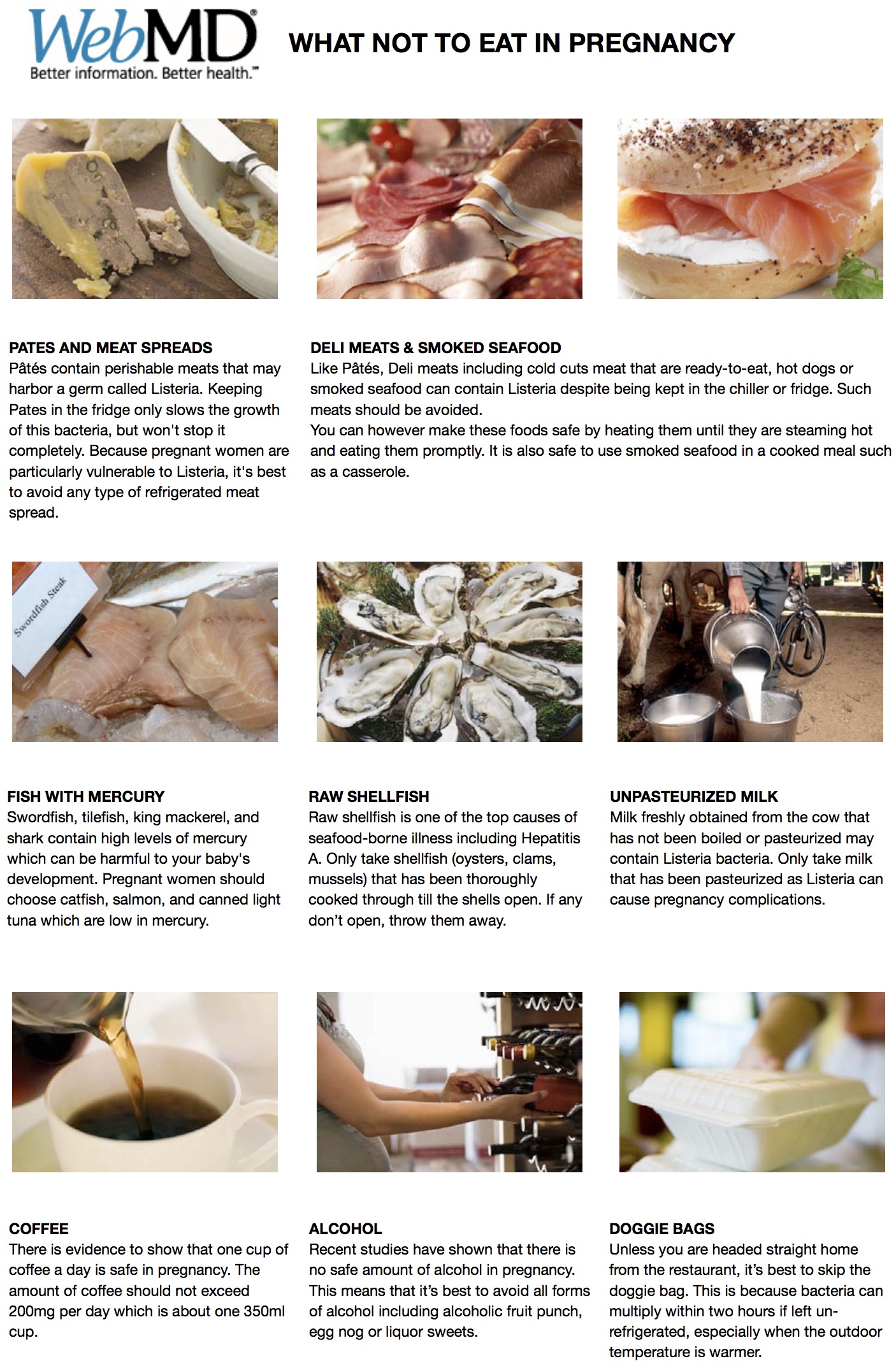Food to Avoid


WHAT NOT TO EAT IN PREGNANCY?
AVOID SOFT CHEESE
Soft cheese such as brie, camembert, feta, blue cheese, queso blanco, queso fresco, and panela are made with unpasteurized milk. They can harbour listeria bacteria, which can cause miscarriage, premature delivery, and death. It is best to avoid soft cheese in pregnancy.
COOK MEATS THROUGH
Raw or undercooked meat can harbor toxoplasma and a variety of bacteria. Always ensure the meat is steaming hot and thoroughly cooked. That means cooking meats at temperature of at least 75° C or 165° F.
FRESH PRE-STUFFED POULTRY
A pre-stuffed turkey or chicken offers a convenient meal. But the juice from the raw meat can mix with the stuffing and promote bacterial growth. A safer option is to get frozen pre-stuffed poultry and cook it directly without defrosting with the thigh meat reaching 82 ºC or 165° F.
SUSHI AND SASHIMI
Raw food like sushi and sashimi may contain harmful parasites and bacteria. The FDA recommends against taking raw food in pregnancy.
MAYONNAISE AND TIRAMISU
Some salad dressings like Bearnaise sauce, Mayonnaise and Hollandaise sauce may contain raw eggs. Many homemade desserts like mousse, meringue and tiramisu may also contain raw eggs. As raw eggs may contain harmful germs, these salad dressings and desserts should be avoided.
RAW SPROUTS
Pregnant women should not eat raw sprouts of any kind, including alfalfa, clover, and radish. Bacteria can get into the seeds before the sprouts begin to grow, and these germs are nearly impossible to wash away. Cook sprouts thoroughly to destroy any bacteria.
UNWASHED FRUITS & VEGGIES
Always rinse fruits and veggies thoroughly under running water to avoid a parasite called toxoplasma which can cause toxoplasmosis in pregnancy. Scrub the vegetable surface with a small brush. Cut away any bruised areas, because these may harbor bacteria.
BEWARE OF FRESH JUICE
Fresh fruits that are not washed thoroughly may contain salmonella and E. Coli. Always checked that fresh squeezed juice are promptly prepared cleanly. To be safe, it’s best to only consume only pasteurized juices.
PATES AND MEAT SPREADS
Pâtés contain perishable meats that may harbor a germ called Listeria. Keeping Pates in the fridge only slows the growth of this bacteria, but won't stop it completely. Because pregnant women are particularly vulnerable to Listeria, it's best to avoid any type of refrigerated meat spread.
DELI MEATS & SMOKED SEAFOOD
Like Pâtés, Deli meats including cold cuts meat that are ready-to-eat, hot dogs or smoked seafood can contain Listeria despite being kept in the chiller or fridge. Such meats should be avoided. You can however make these foods safe by heating them until they are steaming hot and eating them promptly. It is also safe to use smoked seafood in a cooked meal such as a casserole.
FISH WITH MERCURY
Swordfish, tilefish, king mackerel, and shark contain high levels of mercury which can be harmful to your baby's development. Pregnant women should choose catfish, salmon, and canned light tuna which are low in mercury.
RAW SHELLFISH
Raw shellfish is one of the top causes of seafood-borne illness including Hepatitis A. Only take shellfish (oysters, clams, mussels) that has been thoroughly cooked through till the shells open. If any don’t open, throw them away.
UNPASTEURIZED MILK
Milk freshly obtained from the cow that has not been boiled or pasteurized may contain Listeria bacteria. Only take milk that has been pasteurized as Listeria can cause pregnancy complications.
COFFEE
There is evidence to show that one cup of coffee a day is safe in pregnancy. The amount of coffee should not exceed 200mg per day which is about one 350ml cup.
ALCOHOL
Recent studies have shown that there is no safe amount of alcohol in pregnancy. This means that it’s best to avoid all forms of alcohol including alcoholic fruit punch, egg nog or liquor sweets.
DOGGIE BAGS
Unless you are headed straight home from the restaurant, it’s best to skip the doggie bag. This is because bacteria can multiply within two hours if left unrefrigerated, especially when the outdoor temperature is warmer.
